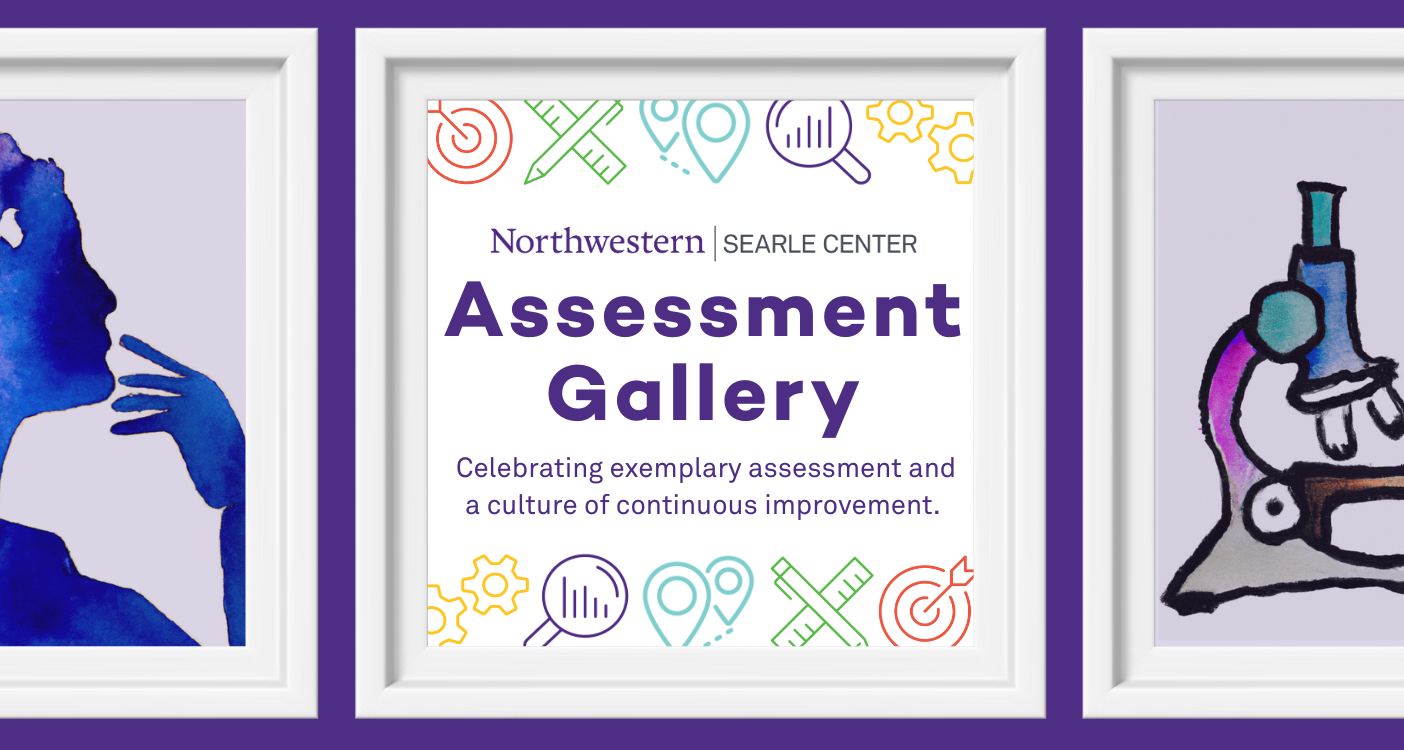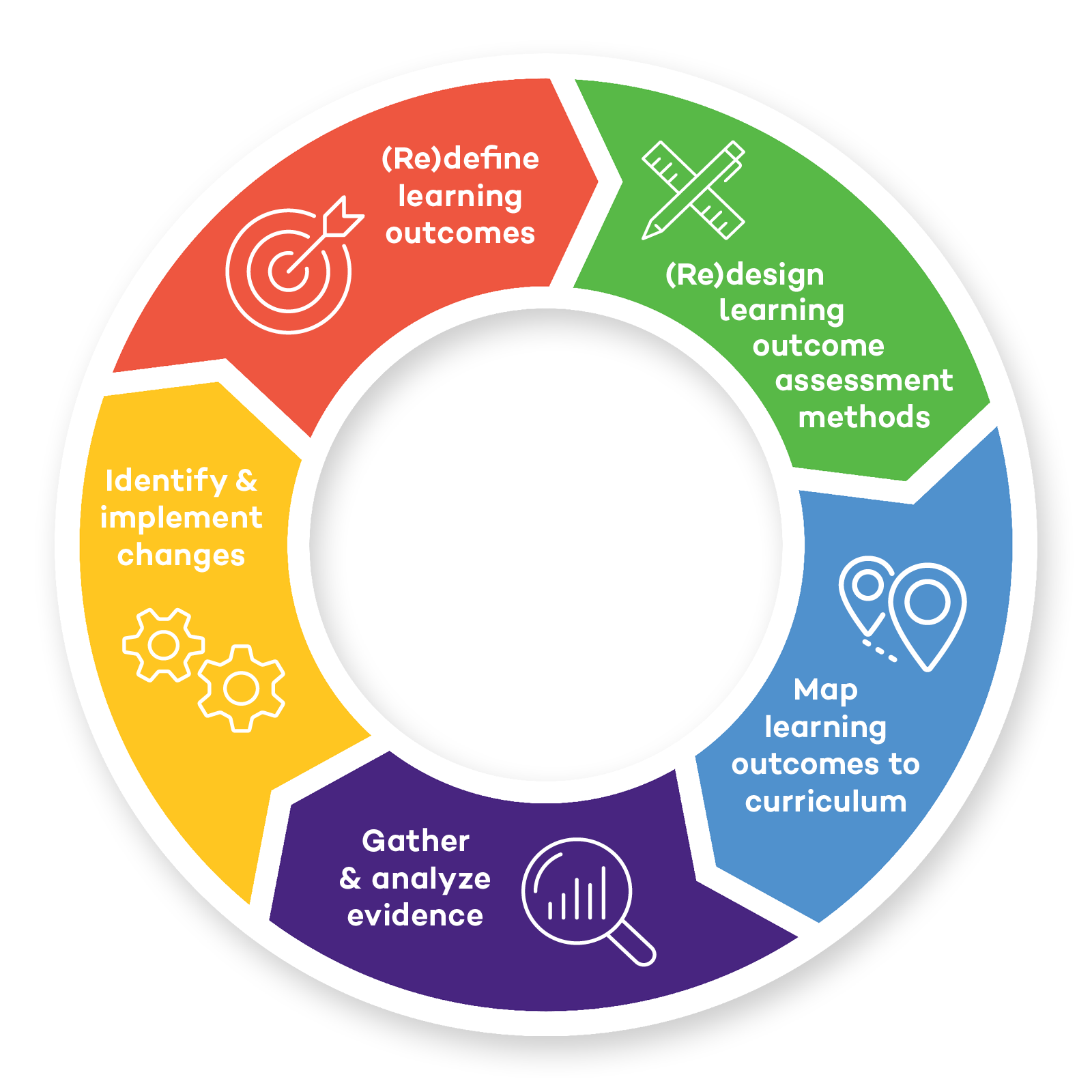| VIEW IN BROWSER | |
 | ||||||||||||||||||||||
Letter from the Senior Director of the Searle Center Learning Together: Events, Programs, & Services
Advancing a Culture of Lifelong Learning Teaching Tips: Pinch Points & Plus Ones | ||||||||||||||||||||||
Welcome to Spring!Dear Colleagues,Our spring newsletter celebrates Northwestern’s thriving culture of assessment. We work with educators who are curious about ways to make assessment practices more rigorous and transparent for transformative student learning. We partner with departments/programs/schools that want to use their assessment data to inform pedagogical and curricular decision-making. This continuous improvement mindset elevates Northwestern’s promise of excellent teaching and the personal and intellectual growth of our students. The Searle Center is proud to co-lead Northwestern’s Assessment and Accreditation Council (AAC), which upholds our institutional commitment to ongoing assessment, ensuring the fulfillment of meaningful student learning outcomes and the reaffirmation of accreditation through the Higher Learning Commission (HLC). In our Educator Spotlight, Dr. Lori Barcliff Baptista draws on her experiences as a member of the AAC and shares her insights on building a strong culture of assessment through participatory action. Preparing for HLC’s upcoming site visit at the end of April is an opportunity to deepen our reflection and to showcase the excellent, iterative work of programs advancing systematized assessment of student learning. Our recently launched Assessment Gallery features 41 academic and co-curricular submissions. Stimulating assessment to drive substantive course and curricular change is a central priority in the Searle Center’s forthcoming strategic plan. To support ongoing professional learning, we provide curated assessment resources, including many books available in our Menges Library collection. In our “What We Are Reading” section, we highlight Rigor by Design, Not Chance (2023), which advocates for a student-centered approach to rigor through co-created criteria for success and actionable, growth-oriented feedback. As a “Plus One,” we offer a glimpse into the most recent edition of the classic Classroom Assessment Techniques (2024), filled with formative feedback tools designed to investigate and optimize student learning throughout a course. Registration is open for our spring University Practicum on Supporting Student Success, which includes a live session on assessing student success and a learning lab on creating rubrics with AI, and for our summer Course Design Institute, which covers assessments that promote both student learning and more efficient use of instructor time. Instructor vitality has been an emergent theme in our strategic plan community conversations. Listening carefully to that feedback, we have added instructor vitality as a key initiative with the goal to “cultivate a relationship-rich environment where instructors can circumvent burnout by connecting and learning with colleagues who share similar interests, roles, or experiences, empowering them to maintain a sustainable commitment to learning and teaching across the span of their careers.” In that spirit, we invite you to the inaugural Searle Center Community Celebration, where you'll not only get a more extensive look at our new strategic plan, but you can enjoy some great food and collegial conversation. Warm Regards,Jennifer Keys, Ph.D. | ||||||||||||||||||||||
 | ||||||||||||||||||||||
| ||||||||||||||||||||||
|
University Practicum on Supporting Student Success Since it began in 2020, the University Practicum, which was also a Higher Learning Commission Open Pathway Quality Initiative, has engaged over 1,000 Northwestern instructors of all levels, backgrounds, and teaching contexts through its annual practicum on timely topics of learning and teaching. This year’s practicum on Supporting Student Success focuses on evidence-driven teaching techniques for (re)defining, facilitating, and assessing success to enhance both learning outcomes and student well-being. The practicum reinforces the importance of assessment in supporting student success through the implementation of intentional and transparent practices, meeting students where they are and supporting them in achieving course learning outcomes. This year's programming includes a synchronous live session on assessing student success and a learning lab on creating rubrics with AI, facilitated by Lina Eskew, Senior Assistant Director of Assessment and author of How to Use Copilot and ChatGPT to Create Rubrics (2024) and co-author of Data-Driven Collaboratives: Enhancing Career-Spanning Faculty Development Through a University Practicum (Eskew & Sandoval-Lee, 2025). Questions about the practicum? Email practicum@northwestern.edu. | ||||||||||||||||||||||
|
Save the Date for a Searle Center Community Celebration Wednesday, June 4, 2025 from 2:00 to 4:00 PM The Searle Center Mark your calendars! This open-house style event promises to be a vibrant and engaging afternoon where you'll get an exclusive look at our new strategic plan and priorities. | ||||||||||||||||||||||
 | ||||||||||||||||||||||
Course Design InstituteBy Kate Flom Derrick, Assistant Director of Reflective Pedagogy We are excited to announce the next iteration of the Course Design Institute (CDI), a transformative experience designed to invigorate and empower instructors at Northwestern. This immersive program offers a unique opportunity for instructors to engage deeply with the principles of effective course design. The CDI guides instructors step-by-step in creating a course where they can have confidence that all enrolled students will have the opportunity to achieve the course goals—no matter how rigorous or ambitious. Participants will learn leading-edge strategies of effective course design that prioritize activities and assessments that best promote student learning while also creating more efficient use of instructor time for their own sustained well-being. David Schieber, Assistant Professor of Instruction in Sociology and 2024 CDI participant shared, "The CDI was a wonderful opportunity to take a step back and think about the big picture goals when putting together a new course. I especially enjoyed brainstorming course objectives with scholars across fields and departments at Northwestern and hearing about the different ways they taught and assessed their students. These conversations helped make my own syllabi and teaching stronger!” Join us for this enriching journey and discover new ways to enhance your courses and support student learning. | ||||||||||||||||||||||
Educator Spotlight: Lori Barcliff BaptistaBy Laura Ferdinand, Assistant Director of Content and Communications Each quarter, we feature Northwestern educators doing innovative work in learning and teaching. These interviews showcase their educational journeys, signature styles, and how their teaching has been shaped by their work with the Searle Center. | ||||||||||||||||||||||
| ||||||||||||||||||||||
In mid-March, I had the honor of speaking with Lori Barcliff Baptista about the culture of assessment at Northwestern. We met in her sunny office on the top floor of the Ryan Center for the Musical Arts, which offers a stunning view of Lake Michigan. Affectionately known as the "S.S. Ryan" by the students who study and perform there, it felt fitting to be at the helm of this great “ship,” given Dr. Barcliff Baptista's significant contributions to leading assessment initiatives at Northwestern, especially in her role as a member of the Assessment and Accreditation Council. The following is an excerpt from our conversation. What advice would you give to faculty members or administrators looking to build a strong and lasting culture of assessment within their own schools or colleges? It's a way of going back to participatory action. What is it we already do that we value that helps us make decisions, inform things, and sustain it? How do we expand it? How do we make the information available? We have a SharePoint site that is updated to make sure that people have access to a lot more of these tools. Particularly, Searle does a wonderful job in terms of providing outlets for instructors to explore best practices in teaching and instruction and thinking about different modalities. I think part of it is realizing people don't know what they don't know about what's available to be supportive, and then with what we do know, being transparent about how we're using it to make other decisions. | ||||||||||||||||||||||
 | ||||||||||||||||||||||
Assessment GalleryBy Lina Eskew, Senior Assistant Director of Assessment In partnership with the Assessment and Accreditation Council, the Searle Center launched the Assessment Gallery in 2024 to highlight Northwestern’s commitment to program-level assessment of student learning. The Assessment Gallery represents an evolution from the 2016 Assessment Repository, which was originally designed to collect evidence of course-level assessment. The new Assessment Gallery is a public, searchable online platform that showcases concrete examples of program-level assessment efforts within schools and co-curricular units to spark ideas and share effective practices. For its launch, Assessment and Accreditation Council members invited schools, programs, and co-curricular units to submit program-level assessment updates, detailing their stage in the assessment cycle, newly developed assessment artifacts (e.g., rubrics, course maps, internal reports), evidence of students’ achievement of program learning outcomes, and insights about how assessment data informs curricular changes. In its first year, an impressive 41 programs from all twelve Northwestern schools, along with select co-curricular units, contributed to the Assessment Gallery. These submissions demonstrate the thoughtful, systematic, and iterative assessment work that faculty and programs regularly engage in. Among the many exemplary contributions, we highlight specific submissions that illustrate each stage of the assessment cycle with concrete examples—ideal for those seeking clear, practical models of the cycle.
Stages of the Assessment Cycle with Featured Examples:
We invite you to contribute to the Assessment Gallery by sharing your program-level assessment efforts. As we expand the Gallery, we look forward to showcasing the rich diversity of authentic assessment practices at Northwestern! | ||||||||||||||||||||||
What We're ReadingBy Lina Eskew, Senior Assistant Director of Assessment Rigor by Design, Not Chance: Chance: Deeper Thinking Through Actionable Instruction and AssessmentBy Karin Hess What if rigor in education wasn’t about making learning harder, but about making it deeper? In Rigor by Design, Not Chance (2023), Karin Hess challenges the common misconception that rigor equates to difficulty or compliance. Instead, she argues that rigor should be seen as a structured, intentional, and student-centered approach—one that fosters independent thinking and empowers students to take ownership of their learning. Hess centers student engagement in her approach to assessment, advocating for assessments that not only measure learning but actively support it by making student thinking visible and actionable. Examples include:
| ||||||||||||||||||||||
 | ||||||||||||||||||||||
Classroom Assessment TechniquesBy Lauri Dietz, Director of Pedagogy and Assessment Now in its third edition, Classroom Assessment Techniques: Formative Feedback Tools for College and University Teachers (2024) by Thomas A. Angelo with Todd D. Zakrajsek builds on the formidable legacy of Cross and Angelo’s first (1988) and second (Angelo and Cross, 1993) editions. Even if an instructor is unfamiliar with the books themselves, there’s a good chance their pedagogy has been influenced by some of the 50+ evidence-based techniques found in their pages. Thanks to Cross and Angelo, practices such as the minute paper, muddiest point, concept map, and background knowledge probe have become ubiquitous in higher education to help instructors and students gain timely feedback about student learning so that we can move from “assuming” learning is happening to “asking” (Angelo and Zakrajsek, 2024, p. 4). Classroom Assessment Techniques (CATs) are “designed specifically to investigate how well students are learning” so that instructors and students can make adjustments in the initial and intermediate points of a learning experience (p. 5). As with the prior editions, this latest installment offers practical, readily adaptable tools with step-by-step directions that typically take little effort to implement yet yield rich, actionable data about student learning. Plus, finding just the right CAT for your class is easy with new indices based on Bloom’s and Fink’s learning taxonomies. In addition to updates to prior CATS that add more research to support their efficacy and examples from diverse disciplines, Angelo and Zakrajsek include 15 new CATs, such as
To learn about how to implement these CATs and more, the Searle Center’s Menges Library has copies for loan. | ||||||||||||||||||||||
|
|
Copyright © 2024 Searle Center for Advancing Learning and Teaching |
















